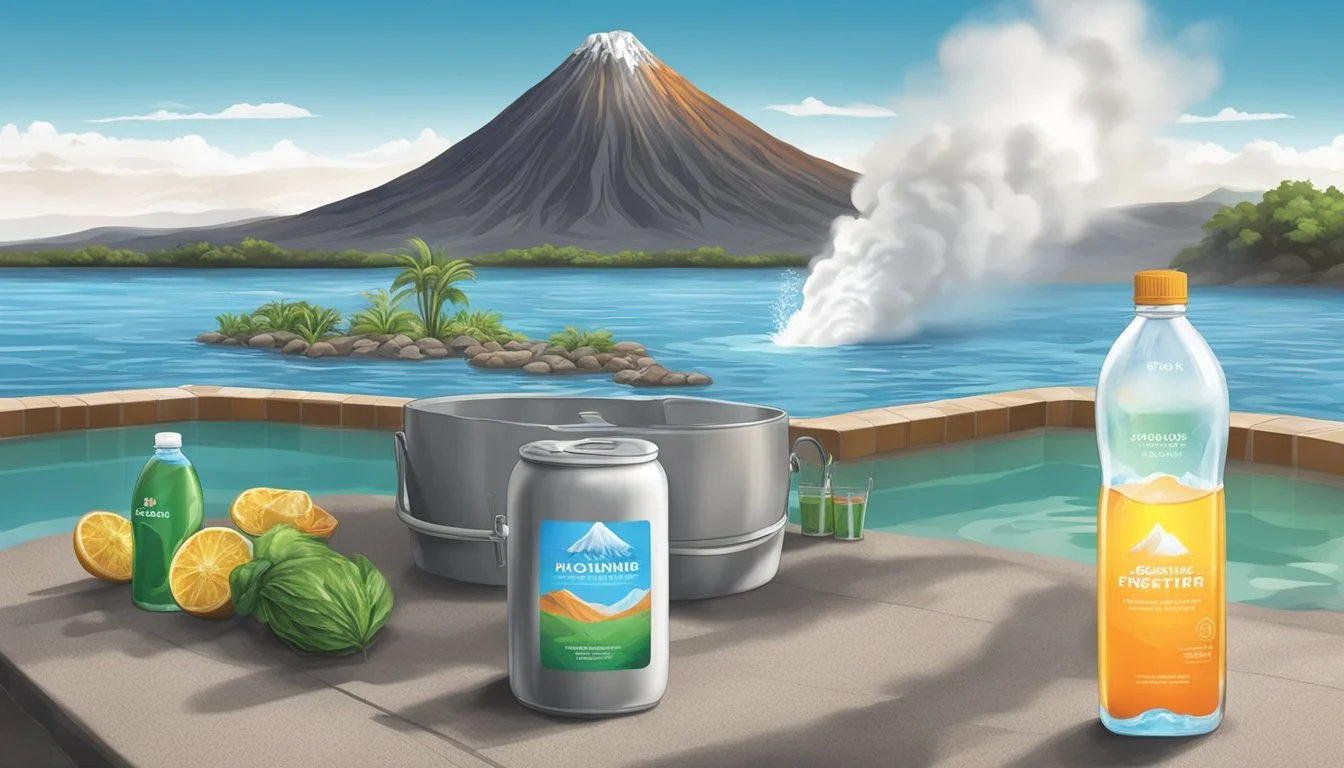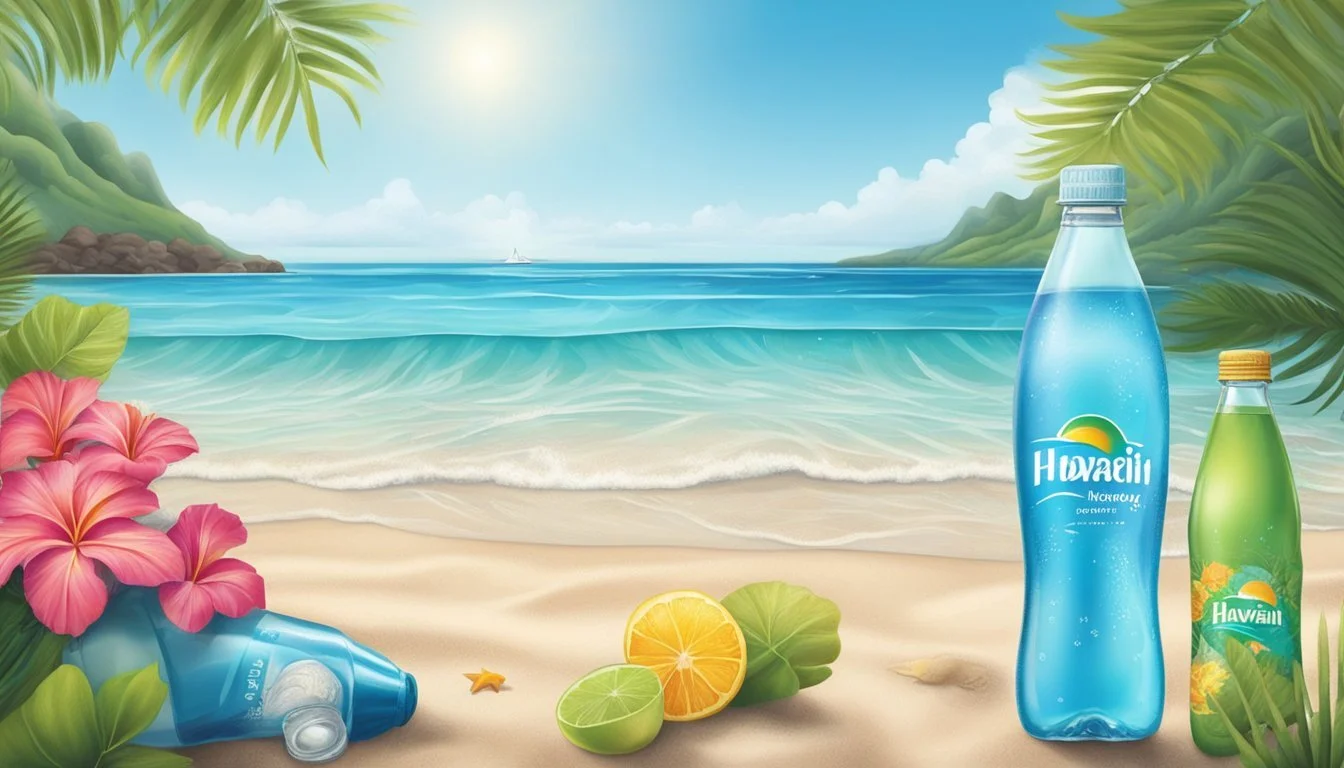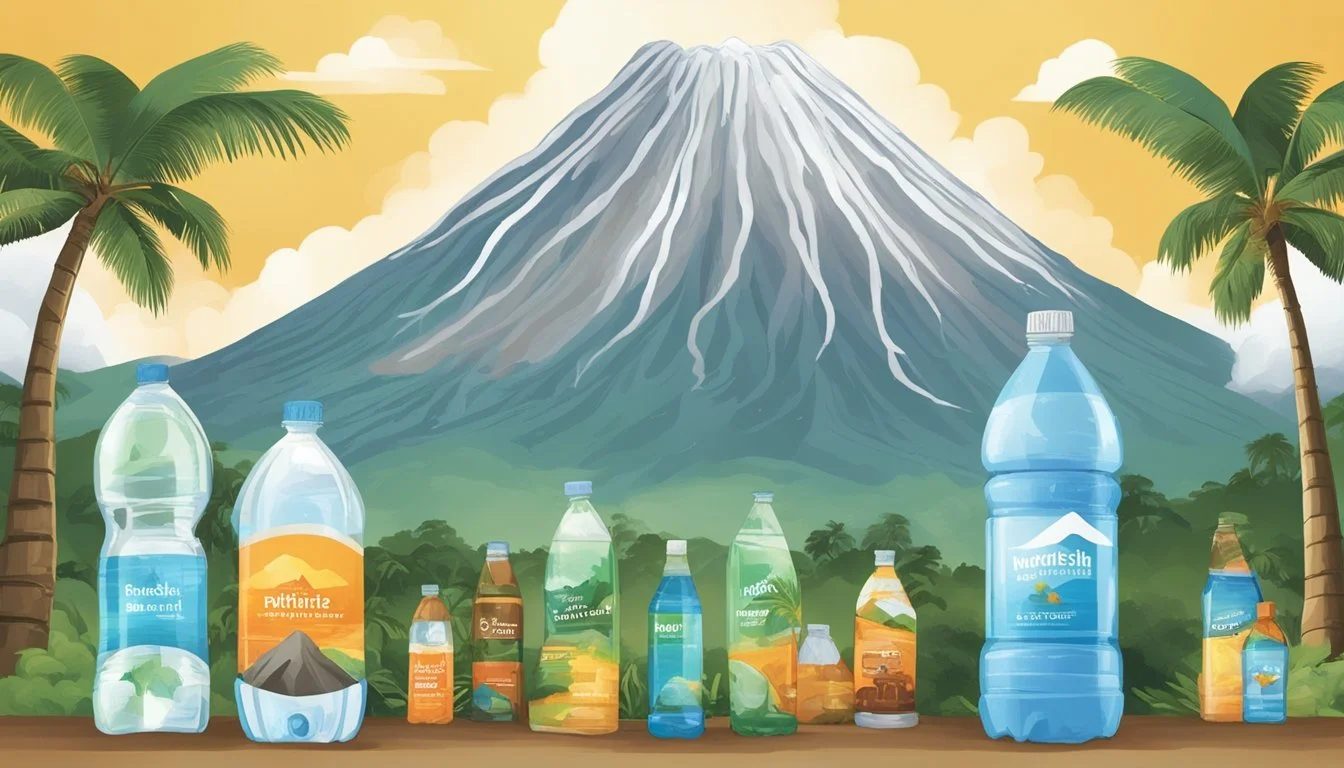Hawai’i Volcanic vs. Action
Which Bottled Water is Better?
The debate over which bottled water is better—Hawai’i Volcanic or Action—is one that many health-conscious consumers are keen to settle. Hawai’i Volcanic boasts a naturally alkaline pH level that ranges between 7.6 and 8.2, making it effective at neutralizing body acidity. This is due to its unique volcanic filtration process that enriches the water with essential minerals.
In contrast, Action offers its own distinct advantages, such as a rigorous purification process to ensure absolute purity and a balanced mineral content. While Hawai’i Volcanic focuses on natural alkalinity, Action emphasizes purity and consistent quality across its bottled water range.
Both brands are committed to sustainability, though Hawai’i Volcanic has a clear focus on minimizing environmental impact by bottling a minute fraction of the water yielded at the volcanic slopes. The reader will find that their choice between these two brands hinges on personal priorities—whether it be natural alkalinity or absolute purity.
Origin and Source of the Waters
The origins of Hawai’i Volcanic and Action bottled waters trace back to unique sources, setting them apart in the beverage market.
Hawai’i Volcanic draws its water directly from the volcanic landscapes of Hawaii. This water is sourced from the pristine environments near the eastern base of the Mauna Loa Volcano in Hilo, Hawai’i. The region is known for its rich, bio-diverse forest preserves, which contribute to the purity of the water.
This volcanic water undergoes a unique filtration process as it travels through porous volcanic rock and lava filtered pathways. Originating from rain and snowmelt at the top of Mauna Loa, the water slopes down towards family-owned deep wells. With constant rain at the source—up to 360 days a year—the supply is plentiful and continuously replenished.
Waiakea, another brand often associated with Hawai’i Volcanic, also sources its water from Hawaii. It is known for its naturally alkaline properties and sustainability initiatives. The Mauna Loa Volcano plays a critical role in supplying this water, which is filtered through 14,000 feet of porous lava rock.
On the other hand, Action water boasts a distinctly different origin. Typically sourced from well-protected natural aquifers, Action focuses on ensuring its water is drawn from deep underground reserves that offer consistent purity and mineral content. The specific geological formations for Action water include various types of rock and sediment layers, providing a unique taste and mineral profile.
In summary, while Hawai’i Volcanic benefits from its volcanic origin through nature’s filtration system, Action capitalizes on the purity of deep natural aquifers, each offering unique qualities that cater to different consumer preferences.
Chemical Composition and Health Benefits
Comparing Hawai’i Volcanic and Action bottled waters involves analyzing key elements like mineral content, pH level, and electrolyte availability. This section breaks down these factors to provide a clear and direct comparison.
Mineral Content
Hawai’i Volcanic water is rich in natural minerals such as silica, calcium, magnesium, and potassium. These minerals are absorbed as the water filters through volcanic rock. Silica plays a role in promoting healthy bones, skin, hair, and nails.
Action Water also contains significant minerals but lacks the volcanic filtration unique to Hawai’i Volcanic. Its mineral content mainly comes from added sources rather than natural filtration. Both waters provide essential nutrients but differ in sourcing and concentration levels.
pH and Alkalinity
Hawai’i Volcanic features an alkaline pH ranging from 7.6 to 8.5, derived from its natural volcanic filtration process. This alkalinity can contribute to maintaining pH balance in the body, potentially aiding in neutralizing excess acidity.
Action Water, on the other hand, achieves its alkaline status through artificial ionization and electrolysis. While this method ensures a high pH, it's different from the naturally occurring alkaline nature of Hawai’i Volcanic. Consumers seeking naturally alkaline water may prefer Hawai’i Volcanic.
Electrolytes
Hawai’i Volcanic offers a robust array of electrolytes including sodium, calcium, and magnesium. These are naturally infused into the water as it passes through volcanic rock, contributing to hydration and replenishing essential body minerals.
Action Water also provides electrolytes but through artificial enhancement. Though effective, the origin of these electrolytes differs, influencing consumer preference depending on sought benefits. Hawai’i Volcanic’s natural electrolyte content may appeal more to those seeking a natural hydration source.
By examining these factors, consumers can make an informed choice between Hawai’i Volcanic and Action bottled waters based on their specific needs and preferences.
Packaging and Environmental Impact
In evaluating Hawai’i Volcanic and Action bottled water, it is crucial to consider the materials used in packaging and their environmental footprint. The assessment includes the sustainability of the bottle materials and the brands' environmental initiatives.
Bottle Materials and Sustainability
Hawai’i Volcanic uses PET plastic (polyethylene terephthalate), which is BPA-free and recyclable. Their bottles often incorporate recycled PET (rPET), contributing to reduced virgin plastic usage. PET is lightweight, reducing transportation emissions, yet concerns about its end-of-life impact remain.
Action opts for aluminum bottles, promoting a more sustainable and reusable alternative. Aluminum is highly recyclable and generally retains much of its value post-recycling. This approach aligns with environmental goals by minimizing waste and encouraging fewer single-use plastics.
Each company's choice in materials reflects a commitment to reducing their environmental impact through either recyclability or reusability.
Environmental Initiatives
Hawai’i Volcanic engages in various conservation efforts, particularly focusing on protecting Hawaiian ecosystems. They partner with local organizations to support water conservation projects and promote sustainable practices.
Action integrates environmental initiatives such as partnerships with Whole Foods Market, emphasizing the sale of their bottles in stores committed to sustainability. They also run programs to raise awareness about reducing single-use plastics and offer incentives for consumers to recycle their bottles.
Both companies strive to lessen their carbon footprint and impact on the planet through targeted initiatives and thoughtful partnerships aimed at fostering environmental responsibility.
Taste Profile and Water Types
Hawai’i Volcanic and Action both offer unique experiences in taste and water types. Each brand brings its own qualities, from the mineral composition to the pH level, influencing the taste and type of water offered.
Comparison of Taste
Hawai’i Volcanic is known for its smooth, soft taste with a slightly sweet undertone. This premium bottled water benefits from being filtered through volcanic rock, which adds natural minerals like silica, calcium, and magnesium. This gives it a distinctively smooth-to-taste profile.
Action water, while less detailed in the provided results, is often appreciated for its clean and pure taste. This brand delivers a straightforward hydration experience without any noticeable aftertaste, making it a solid choice for those seeking simplicity in their bottled water.
Variety: Still vs. Sparkling
Hawai’i Volcanic offers both still and sparkling water options. The still water maintains its natural alkaline state, with a pH level ranging approximately from 7.6 to 8.2, providing a balanced experience. The sparkling variant, however, is noted to have an acidic pH of about 5, resulting in a more tart and lively flavor.
Action focuses predominantly on still water. This dedication ensures a consistently pure and refreshing product. The absence of a sparkling option means fewer choices for consumers desiring effervescence in their hydration, yet the still water stands out for its unwavering quality and purity.
Brand Philosophy and Community Outreach
Hawai’i Volcanic and Action are both committed to environmental sustainability and community development, each with specific initiatives and partnerships designed to support these goals.
Company Visions and Offers
Hawai’i Volcanic emphasizes its commitment to producing high-quality, naturally alkaline water while maintaining sustainable practices. Sourced from volcanic springs, the water undergoes natural filtration through lava rocks, enriching it with minerals. Their philosophy revolves around preserving the pristine nature of the Hawaiian ecosystem.
Action's vision focuses on providing purified water that not only hydrates but aligns with ethical business practices. They source their water from natural springs and promote it as both pure and affordable. Their offers include various packaging sizes to meet different consumer needs.
Social Responsibility and Partnerships
Hawai’i Volcanic engages actively in environmental restoration projects. For every bottle sold, a portion of the proceeds goes towards initiatives aimed at restoring oceanic health and supporting clean water projects globally. They partner with organizations to ensure their actions have a direct impact on the earth.
Action also prioritizes social responsibility, particularly through partnerships with Pump Aid, an NGO that creates sustainable water solutions in Malawi, Africa. They provide funding to build wells and educational opportunities to communities in need. Their outreach efforts have garnered support and made significant strides toward improving access to clean water.
Both brands share a commitment to making a positive difference, but each leverages different strategies and partnerships to achieve their goals. Hawai’i Volcanic focuses on Earth-centric initiatives, while Action is more involved in humanitarian aid and clean water accessibility.
Health Applications and Recommendations
Hawai’i Volcanic and Action bottled water both offer potential health benefits, but each caters to different needs. Key aspects to consider include their suitability for athletes and how they contribute to healthy hydration.
Suitability for Athletes and Active Lifestyles
Athletes and individuals with active lifestyles often seek water that provides extra benefits beyond mere hydration. Hawai’i Volcanic stands out due to its natural filtration process through volcanic rock, enriching the water with minerals like silica. Silica is believed to support bone, hair, skin, and nail health. These additional minerals can be especially beneficial for those under physical stress that may deplete these elements.
Action water, known for its ionized properties and added baking soda, aims to offer rapid rehydration. The ionization process helps separate water into alkaline and acidic components, potentially aiding faster absorption. Baking soda contributes to maintaining muscle function by helping to balance the body’s pH levels after rigorous activity.
Role in Healthy Hydration
Healthy hydration is not just about drinking enough water but also about the quality of the water consumed. Hawai’i Volcanic boasts a naturally alkaline pH ranging from 7.6 to 8.5, sourced directly from a deep well at the Mauna Loa volcano. This natural alkalinity can assist in balancing the body’s pH and supporting overall well-being.
Action water is artificially alkaline, achieving this through an ionization process. While some see value in the higher pH levels for neutralizing acidity, it lacks the natural mineral profile found in volcanic water. Both choices are effective in maintaining hydration, but the preference between naturally alkaline and artificially alkaline may vary based on individual health goals and lifestyle needs.
Consumer Experience and Convenience
While both Hawai'i Volcanic and Action offer high-quality bottled water, their approach to consumer experience and convenience diverges significantly.
Accessibility and Availability
Hawai'i Volcanic water is prominently accessible through various online and offline retailers. It's widely distributed, making it easy for consumers to find both in physical stores and e-commerce platforms. This broad availability is crucial for those seeking naturally alkaline, artesian water regularly.
Action targets a more niche market. Its distribution network is not as extensive, mainly found in specialty stores and select online outlets. This makes it less accessible for everyday purchases, although it appeals to consumers seeking premium water options.
Product Range and Affordability
Hawai'i Volcanic offers a diverse product range, including multiple bottle sizes and packaging options. This flexibility caters to varying consumer needs—from single servings to bulk purchases. The brand also promotes sustainability with 100% RPET bottles, enhancing convenience for eco-conscious buyers.
Action's product range is comparatively limited, focusing on high-end, premium bottled water. Prices are typically higher, reflecting the brand's premium market position. This can be a barrier for budget-conscious consumers but aligns with those willing to invest in exclusive, high-quality water.
In terms of affordability, Hawai'i Volcanic provides more budget-friendly options without compromising quality, making it a convenient choice for a wider audience.
More About Hawai’i Volcanic
Acqua Pana vs Hawaii Volcanic: Which Bottled Water is Better?
Antipodes vs Hawaii Volcanic: Which Bottled Water is Better?
Aqua Carpatica vs Hawaii Volcanic: Which Bottled Water is Better?
Arrowhead vs Hawaii Volcanic: Which Bottled Water is Better?
Boxed Water vs Hawaii Volcanic: Which Bottled Water is Better?
Castle Rock vs Hawaii Volcanic: Which Bottled Water is Better?
Core Hydration vs Hawaii Volcanic: Which Bottled Water is Better?
Deer Park vs Hawaii Volcanic: Which Bottled Water is Better?
Hawaii Volcanic vs 1907water: Which Bottled Water is Better?
Hawaii Volcanic vs Alkaline88: Which Bottled Water is Better?
Hawaii Volcanic vs Big Chill: Which Bottled Water is Better?
Hawaii Volcanic vs BodyArmor: Which Bottled Water is Better?
Hawaii Volcanic vs Cascade Mountain: Which Bottled Water is Better?
Hawaii Volcanic vs CBD Living: Which Bottled Water is Better?
Hawaii Volcanic vs Crystal Geyser: Which Bottled Water is Better?
Hawaii Volcanic vs Crystal Lake: Which Bottled Water is Better?
Hawaii Volcanic vs Essence pH10: Which Bottled Water is Better?
Hawaii Volcanic vs Kirkland Signature: Which Bottled Water is Better?
Hawaii Volcanic vs Liquid Death: Which Bottled Water is Better?
Hawaii Volcanic vs Open Water: Which Bottled Water is Better?
Hawaii Volcanic vs Proud Source: Which Bottled Water is Better?
Hawaii Volcanic vs Pure Life: Which Bottled Water is Better?
Hawaii Volcanic vs Purely Sedona: Which Bottled Water is Better?
Hawaii Volcanic vs Richard's Rainwater: Which Bottled Water is Better?
Hawaii Volcanic vs Simple Truth: Which Bottled Water is Better?
Hawaii Volcanic vs Talking Rain AQA: Which Bottled Water is Better?
Hawaii Volcanic vs Weird Water: Which Bottled Water is Better?
Hawaii Volcanic vs Whole Foods 365: Which Bottled Water is Better?
Hawaii Volcanic vs Whole Foods Italian Still Mineral water: Which Bottled Water is Better?
Hawaiian Springs vs Hawaii Volcanic: Which Bottled Water is Better?
Ice Mountain vs Hawaii Volcanic: Which Bottled Water is Better?
Icelandic Glacial vs Hawaii Volcanic: Which Bottled Water is Better?
Just Water vs Hawaii Volcanic: Which Bottled Water is Better?
Mountain Valley Spring Water vs Hawaii Volcanic: Which Bottled Water is Better?
Nestle Pure Life vs Hawaii Volcanic: Which Bottled Water is Better?
Poland Spring vs Hawaii Volcanic: Which Bottled Water is Better?
San Pellegrino vs Hawaii Volcanic: Which Bottled Water is Better?
Smartwater vs Hawaii Volcanic: Which Bottled Water is Better?
Solan de Cabras vs Hawaii Volcanic: Which Bottled Water is Better?
Topo Chico vs Hawaii Volcanic: Which Bottled Water is Better?
Zephyrhills vs Hawaii Volcanic: Which Bottled Water is Better?






